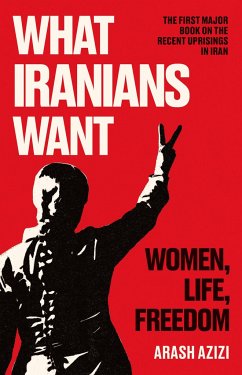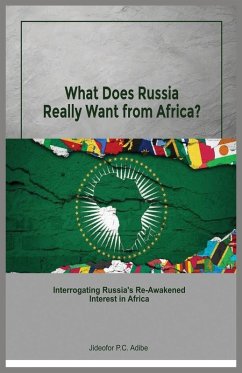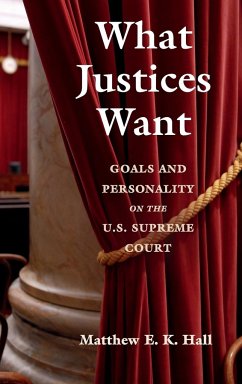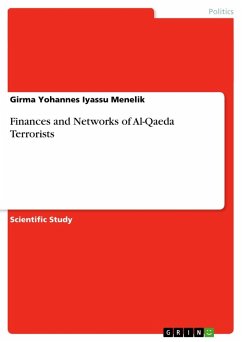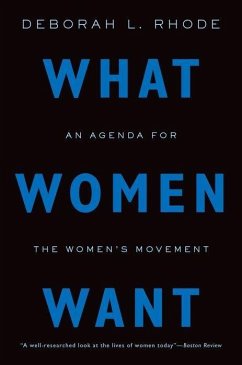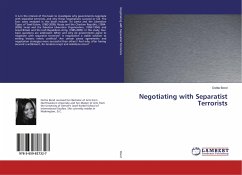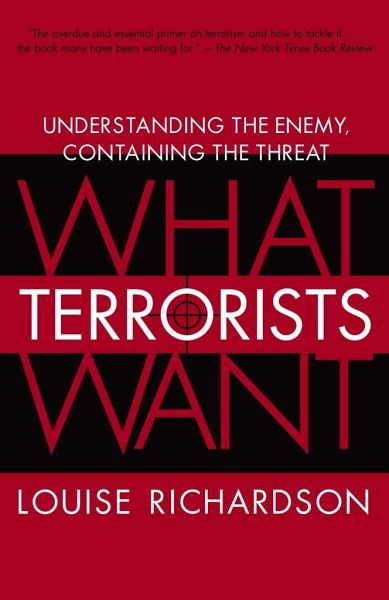
What Terrorists Want
Understanding the Enemy, Containing the Threat
Versandkostenfrei!
Versandfertig in 1-2 Wochen
19,99 €
inkl. MwSt.

PAYBACK Punkte
10 °P sammeln!
This is at the top of my list for best books on terrorism. Jessica Stern, author of Terror in the Name of God: Why Religious Militants KillHow can the most powerful country in the world feel so threatened by an enemy infinitely weaker than we are? How can loving parents and otherwise responsible citizens join terrorist movements? How can anyone possibly believe that the cause of Islam can be advanced by murdering passengers on a bus or an airplane? In this important new book, groundbreaking scholar Louise Richardson answers these questions and more, providing an indispensable guide to the gre...
This is at the top of my list for best books on terrorism.
Jessica Stern, author of Terror in the Name of God: Why Religious Militants Kill
How can the most powerful country in the world feel so threatened by an enemy infinitely weaker than we are? How can loving parents and otherwise responsible citizens join terrorist movements? How can anyone possibly believe that the cause of Islam can be advanced by murdering passengers on a bus or an airplane? In this important new book, groundbreaking scholar Louise Richardson answers these questions and more, providing an indispensable guide to the greatest challenge of our age.
After defining once and for all what terrorism is, Richardson explores its origins, its goals, what s to come, and what is to be done about it. Having grown up in rural Ireland and watched her friends join the Irish Republican Army, Richardson knows from firsthand experience how terrorism can both unite and destroy a community. As a professor at Harvard, she has devoted her career to explaining terrorist movements throughout history and around the globe. From the biblical Zealots to the medieval Islamic Assassins to the anarchists who infiltrated the cities of Europe and North America at the turn of the last century, terrorists have struck at enemies far more powerful than themselves with targeted acts of violence. Yet Richardson understands that terrorists are neither insane nor immoral. Rather, they are rational political actors who often deploy carefully calibrated tactics in a measured and reasoned way. What is more, they invariably go to great lengths to justify their actions to themselves, their followers, and, often, the world.
Richardson shows that the nature of terrorism did not change after the attacks of September 11, 2001; what changed was our response. She argues that the Bush administration s global war on terror was doomed to fail because of an ignorance of history, a refusal to learn from the experience of other governments, and a fundamental misconception about how and why terrorists act. As an alternative, Richardson offers a feasible strategy for containing the terrorist threat and cutting off its grassroots support.
The most comprehensive and intellectually rigorous account of terrorism yet, What Terrorists Want is a daring intellectual tour de force that allows us, at last, to reckon fully with this major threat to today s global order.
KIRKUS- starred review
"The short answer? Fame and payback, perhaps even a thrill. The long answer? Read this essential, important primer.
Terrorist groups have many motives and ideologies, notes Richardson (Executive Dean/Radcliffe Institute for Advanced Study), but they tend to similar paths: They are founded by mature, well-educated men but staffed by less learned and certainly more pliable youths; they are fueled by a sense of injustice and the conviction that only they are morally equipped to combat it; they see themselves as defenders and not aggressors; they often define the terms of battle. And, of course, this commonality: "Terrorists have elevated practices that are normally seen as the excesses of warfare to routine practice, striking noncombatants not as an unintended side effect but as a deliberate strategy." Thus massacres, suicide bombings and assassinations are all in a day's work. Richardson argues against Karl Rove, who after 9/11 mocked those who tried to understand the enemy, by noting that only when authorities make efforts to get inside the minds of their terrorist enemies do they succeed in defeating them, as with the leadership of the Shining Path movement in Peru. Still, as Rove knows, if terrorists share a pathology, then so do at least some of their victims: Once attacked, people in democratic societies are more than willing to trade freedom for security. Richardson closes by offering a set
Jessica Stern, author of Terror in the Name of God: Why Religious Militants Kill
How can the most powerful country in the world feel so threatened by an enemy infinitely weaker than we are? How can loving parents and otherwise responsible citizens join terrorist movements? How can anyone possibly believe that the cause of Islam can be advanced by murdering passengers on a bus or an airplane? In this important new book, groundbreaking scholar Louise Richardson answers these questions and more, providing an indispensable guide to the greatest challenge of our age.
After defining once and for all what terrorism is, Richardson explores its origins, its goals, what s to come, and what is to be done about it. Having grown up in rural Ireland and watched her friends join the Irish Republican Army, Richardson knows from firsthand experience how terrorism can both unite and destroy a community. As a professor at Harvard, she has devoted her career to explaining terrorist movements throughout history and around the globe. From the biblical Zealots to the medieval Islamic Assassins to the anarchists who infiltrated the cities of Europe and North America at the turn of the last century, terrorists have struck at enemies far more powerful than themselves with targeted acts of violence. Yet Richardson understands that terrorists are neither insane nor immoral. Rather, they are rational political actors who often deploy carefully calibrated tactics in a measured and reasoned way. What is more, they invariably go to great lengths to justify their actions to themselves, their followers, and, often, the world.
Richardson shows that the nature of terrorism did not change after the attacks of September 11, 2001; what changed was our response. She argues that the Bush administration s global war on terror was doomed to fail because of an ignorance of history, a refusal to learn from the experience of other governments, and a fundamental misconception about how and why terrorists act. As an alternative, Richardson offers a feasible strategy for containing the terrorist threat and cutting off its grassroots support.
The most comprehensive and intellectually rigorous account of terrorism yet, What Terrorists Want is a daring intellectual tour de force that allows us, at last, to reckon fully with this major threat to today s global order.
KIRKUS- starred review
"The short answer? Fame and payback, perhaps even a thrill. The long answer? Read this essential, important primer.
Terrorist groups have many motives and ideologies, notes Richardson (Executive Dean/Radcliffe Institute for Advanced Study), but they tend to similar paths: They are founded by mature, well-educated men but staffed by less learned and certainly more pliable youths; they are fueled by a sense of injustice and the conviction that only they are morally equipped to combat it; they see themselves as defenders and not aggressors; they often define the terms of battle. And, of course, this commonality: "Terrorists have elevated practices that are normally seen as the excesses of warfare to routine practice, striking noncombatants not as an unintended side effect but as a deliberate strategy." Thus massacres, suicide bombings and assassinations are all in a day's work. Richardson argues against Karl Rove, who after 9/11 mocked those who tried to understand the enemy, by noting that only when authorities make efforts to get inside the minds of their terrorist enemies do they succeed in defeating them, as with the leadership of the Shining Path movement in Peru. Still, as Rove knows, if terrorists share a pathology, then so do at least some of their victims: Once attacked, people in democratic societies are more than willing to trade freedom for security. Richardson closes by offering a set




